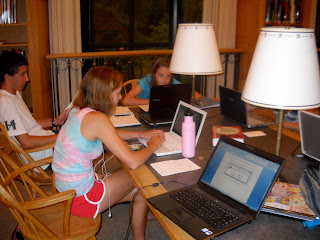By ABIGAIL CRANE
On April 21, Abdon, a Hispanic truck driver in Phoenix, Arizona, was stopped and questioned about his commercial vehicle. He was then taken to the Immigration and Customs Enforcement office because he failed to produce sufficient papers. His wife, Jackie, had to leave work in order to pick up the adequate documents.
Editor's note: This editorial marks the third (and last) in a series entitled "Breaking the Bubble" - the series aims to promote awareness of current events within the "bubble" of the Advanced Studies Program community. You can access the podcast connected to this topic by clicking on the heading and we will hope that you will join us for a lunch discussion on the spill this Friday (July 30th) in the Lowest dining hall.
On April 21, Abdon, a Hispanic truck driver in Phoenix, Arizona, was stopped and questioned about his commercial vehicle. He was then taken to the Immigration and Customs Enforcement office because he failed to produce sufficient papers. His wife, Jackie, had to leave work in order to pick up the adequate documents.
 |
| Arizona Gov. Jan Brewer signs SB 1070 into law. Courtesy: The Arizona Republic |
“It's still something awful to be targeted. I can't even imagine what he felt, people watching like he was some type of criminal,” said Jackie.
Having both been born as US citizens, Abdon and his wife were very unhappy with the situation, as stated by AZfamily.com.
“It doesn't feel like it's a good way of life, to live with fear, even though we are okay, we are legal…[but] still have to carry documents around,” said his wife.
The SB 1070 law, signed in on April 23, 2010, is targeting Hispanics, much like Abdon. It planned to go into effect on July 29. Arizona Governor Jan Brewer signed this law designed to arraign and deport illegal immigrants. The Arizona law declared that it is a crime to reside in Arizona as an illegal immigrant, and that law enforcement has the duty to demand proof of legal residence of those suspected of having illegal immigrant status. This is a clear infringement on civil rights, and would, in turn, cause racial profiling because it is targeting a minority.







.jpg)
.jpg)







